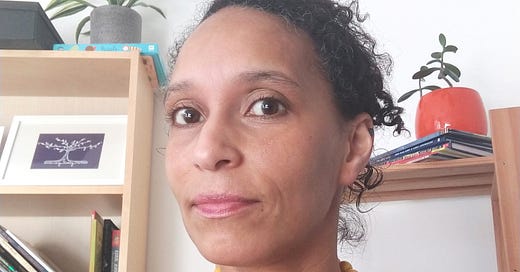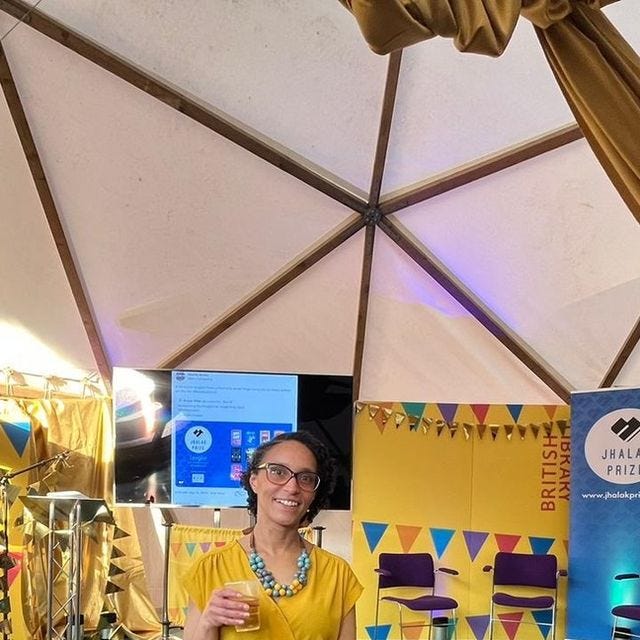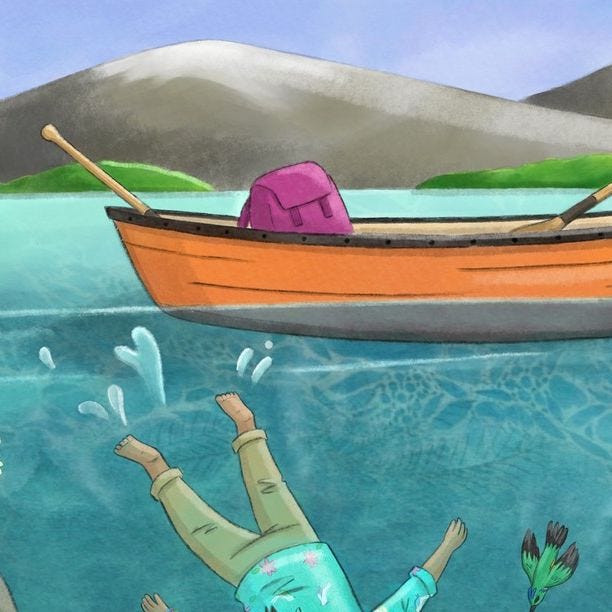Lucy Farfort: “Being mixed has given me an inner strength”
The illustrator on standing up for herself, racism from both sides and reclaiming her identity
Hi, welcome back to Mixed Messages! This week I’m speaking to illustrator Lucy Farfort, who is of mixed Caribbean and white British heritage. Lucy always loved illustration, but when she realised she never drew anyone who looked like her she realised she had to make a change. Now, her books offer the representation she never had growing up and Lucy’s debut picture book, In Our Hands, was shortlisted for the Jhalak Prize and longlisted for The Little Rebels Award. Read her story below.
Can you tell me a bit about your family background?
My mum was from St Lucia, my dad is from London. We grew up in Southend, Essex, which was weird because all my Black side of the family were in London. It wasn’t a very diverse area when I was a kid in the ‘80s. It was quite difficult in some respects for me and my sister.
My sister grew up in the ‘70s and I think her experience was far worse. She was bullied a lot. By the time I was growing up, things had opened up a bit. Perhaps she helped to protect me and made me feel like it’s ok to be who I am.
Did you feel connected to your Caribbean culture?
I think me and my sister felt disconnected because we didn’t see our Black family who lived in London frequently. I don’t think my mum’s side of the family were particularly happy with her marrying a white man, so they didn’t often visit us in Southend where my parents moved to. My school was also predominantly white. I think [our parents] just wanted to focus on us fitting in rather than bringing our cultural heritage to the fore and drawing attention to it.
I do often wonder how my mum and dad felt about moving away from the Caribbean side of my family in London to somewhere that was quite monocultural and not very ethnically diverse.
When we did visit my mum’s family in London it felt quite unusual because I was so used to being surrounded by white culture. Being in a Caribbean household surrounded by different decor and smells associated with West Indian food was quite different. Everytime we went, it felt like “actually, yes, I’m part of this as well,” even though I also remember feeling out of place.
It’s interesting that your mum’s family weren’t happy with the marriage – normally it’s the other way round with a white family disapproving.
I think my mum was 17 when she came over, one of three sisters. She was the only one who married a white man and maybe it was a bit of a shock. I think it was a surprise on my dad’s side too, but as time passed they became more welcoming.
I’ve experienced racism on both sides, and I imagine that’s really common. We weren’t one or the other. There were sly comments and we didn’t quite fit in.
Has your sense of self shifted over time?
I’ve never necessarily felt unconfident in myself, so in that way it’s remained stable. I’m happy in my own skin. I like being mixed-race and different from everyone else around me, that was a bit of a trademark.
Do you speak about identity with your own children?
We live in Newcastle, which isn’t very multicultural as a whole, but thankfully the borough we live in is quite diverse. My son has some BIPOC friends and we talk about his heritage, especially my mum as she passed away before he was born. I try to explain his Caribbean heritage to him – it’s so distant for him. He quite likes Caribbean food.
My husband is white so my son is quite light-skinned. Every now and again he might bring up how my skin is different from his or he’ll talk about his friends’ skin at school and how everyone has different colour skin, and we’ll chat about that.
I’d love to hear more about your work, and the importance of representation in illustration.
When I grew up there were no books with children who looked like me. I was always into drawing, but I always drew white people. I never even realised until I was in my early ‘30s. As soon as I did, I wanted to try and claim back my identity and help other children do the same.
I think because I never saw myself, making children’s books didn’t occur to me as a career, but when I got into it I made a conscious effort to draw books with people who look like me or BIPOC people who need it.
How do you want the conversation to develop on mixedness?
More understanding is needed. I do think a lot of people see mixed-race as all about skin. That is obviously a big part of it, but it covers the whole world. The options on most forms also say ‘mixed and white,’ which is part of the problem as well. There’s definitely a generalisation. The complexities, nuance and interesting parts need to be teased out. There are different facets of being from diasporas as well.
What’s the best thing about being mixed for you?
It’s given me confidence in a way. I’ve never been a confident person, but it’s given me an inner strength to stand up for myself. I feel like it’s made me a more empathetic person, whereas a lot of people I know don’t necessarily always see other points of view or want to see the other side of the story. I’m always trying to strive for the other side.
Can you sum up your mixed experience in one word?
The best way I can describe it is mixed. The experience has been mixed, neither good nor bad. Sometimes it’s been difficult, sometimes I’ve felt empowered by it.
Get your copy of In Our Hands here. Follow Lucy on her website, Twitter or Instagram. Lucy is also part of Imagine a Story, Southbank Centre’s creative writing project that aims to get young people in the UK to see themselves in their writing. Next week I’ll be talking to actor Narayan Hecter. Subscribe to get Mixed Messages in your inbox on Monday.
Enjoy Mixed Messages? Support me on Ko-Fi! Your donations, which can start from £3, help me pay for the transcription software needed to keep this newsletter weekly, as well as special treats for subscribers. I also earn a small amount of commission (at no extra cost to you) on any purchases made through my Bookshop.org affiliate links.
Mixed Messages is a weekly exploration of the mixed-race experience, from me, Isabella Silvers. My mom is Punjabi (by way of East Africa) and my dad is white British, but finding my place between these two cultures hasn’t always been easy. That’s why I started Mixed Messages, where each week I’ll speak to a prominent mixed voice to delve into what it really feels like to be mixed.






